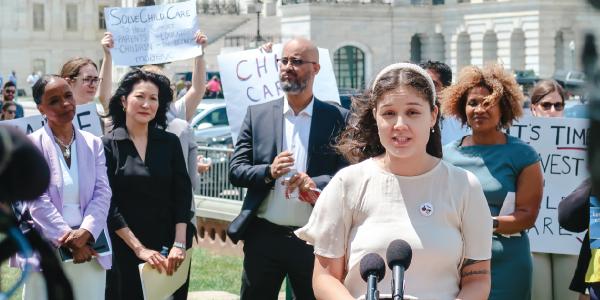Making Connections: Substantial, Sustainable, and Comprehensive Investment Is Needed to Move Us Forward

You are here
Daily, in rural, urban, and suburban communities across this country, early childhood educators like Mildred—a family child care provider and Lasting Legacy Scholar from Northern Virginia, who joined me at a press conference on Capitol Hill before the State of the Union—are doing everything they can to stave off the child care crisis that is growing all around us.
Throughout the COVID-19 pandemic, NAEYC has been conducting surveys of the field to understand and share the experiences that educators are having. These results have enabled us to ensure your voices are being heard across the media and by policymakers. Results from our most recent field survey, released in November 2022, show that uncertainty about the future is impacting the present. Over 12,000 early childhood educators weighed in, and their responses underscore both the positive impact of federal stabilization grants and the necessity of federal-level investment to address the continuing uncertainty:
- In the past year, money from stabilization grants often meant a wage increase and/or supplement to support the health and wellness of staff.
- Still, staffing shortages are caused by low compensation. In fact, 70 percent reported they could not recruit or retain staff because of low compensation.
- One-third of respondents were thinking about leaving their jobs or closing their programs. For many, competitive wages would make the difference.
Staff shortages are leading to supply shortages that threaten families’ abilities to work, children’s access to safe and quality care, and educators’ health and well-being. Because we do not know where the money will come from after stabilization grants end, there is fear about what that will mean for already financially and emotionally stressed families and programs. If not reversed with the support of congressional investments in the child care and early learning workforce, this exodus will deepen the supply, quality, and affordability crises for years to come. Unfortunately, this isn’t a future problem. It’s a now problem.
Your stories corroborate what our surveys have found. I have had the opportunity to connect with many of you throughout my first year as NAEYC’s CEO, and each of you has shared how heartbreaking it is to turn families away because you do not have the staff to provide care for those who need it. Many of you can’t find or afford to pay early childhood educators. All of us are feeling the impact of the early childhood workforce crisis. Cynthia, the executive director at Open Door Preschool, the oldest NAEYC-accredited program in Austin, Texas, shared with me how she has had an empty infant room for months due to not being able to hire staff. She was excited to finally be able to open the classroom with staff coming on board.
Although federal relief funding has provided a lifeline for child care and early learning, more needs to be done to prioritize, protect, and provide investments that fund child care and early learning in the short and long term. There is a need for a substantial, sustainable, and comprehensive investment to help move us toward ample child care supply and capacity, support quality options for families, invest in educators’ compensation, and create a strong and secure foundation for child care and early learning across the country.
This is the charge more than 800 NAEYC members responded to when they joined us virtually and in person for this year’s Public Policy Forum to call on Congress to promote, protect, and prioritize investment in early childhood education. This is the very charge Mildred responded to when she joined in the press conference. It is why in this issue of Young Children, you will find articles and recommendations about how to share your story, how to advocate for desperately needed investments, and how to be part of system change locally, in your state, and beyond.
I have had the opportunity to connect with many of you throughout my first year as NAEYC’s CEO, and each of you has shared how heartbreaking it is to turn families away because you do not have the staff to provide care for those who need it.
Across the country, we have been and will continue to lead this work alongside you and in partnership with our incredible affiliates. Together, we will continue to lead, knowing we are doing this in community, in a space of belonging that applies to each and every one of us. We are doing this knowing that our efforts reflect the diverse range of experiences we bring as early childhood educators, program directors, child care program business owners, higher education faculty, trainers, state and local administrators, career advocates, families, and invested members of our society. When we stand together, speaking for, with, and on behalf of all early childhood settings and recognizing our power as a collective, we will overcome setbacks and move forward in service of what we know young children, families, educators, and our society need.
I am filled with so much joy, faith, and pride that for so many years, and in so many ways, you answer our call to be part of this movement to advocate for our children, our families, and each other. Together, we will continue to mobilize and build our collective will to increase equitable access to quality for all children, to increase compensation and wages, to open the doors of higher education to all early childhood educators, and to remove the systemic and institutional barriers early childhood educators feel every single day. Together, we will continue to stay focused, hopeful, resolute, and unwavering in our shared agenda!
Thank you for your resolve to stand up for your profession, with other members of this profession and alongside NAEYC as your professional membership association.
Copyright © 2023 by the National Association for the Education of Young Children. See Permissions and Reprints online at NAEYC.org/resources/permissions.
Michelle Kang serves as NAEYC’s Chief Executive Officer.
